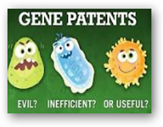
This case has been bounced around more than once and the links below will give you a little more history to include a 60 minute segment done about a year ago. This makes biotech and drug companies happy as they all own thousands of sequences and some are even buying sequencing companies, such as Roche.
Does Myriad Own Breast Cancer Genes And What is the Future of Patents as Relates to Healthcare – 60 Minutes
Myriad's BRCA (DNA Breast Cancer) Patent Ruled Invalid Today – US Patent and Trademark Office Also Off the Hook
On the other side of the coin scientists, patients and doctors are not so happy as this prevents free exchange of ideas and research and when you think of it, DNA is ours and its just the formulas for the sequencing that carry the patents and this may slow down the personalized medicine movement as well. This kind of doesn’t make a lot of sense here as the Supreme Court rules that companies could not patent observations on DNA, which is called a natural phenomena. Where’s the next court room for this challenge, back to the Supreme Court? I have a feeling this one may not be over yet. BD
The lawsuit against Myriad Genetics, a diagnostic company, based in Salt Lake City, Utah, that holds patents on the genes BRCA1 and BRCA2, has bounced from court to court since 2010. In a 2-1 decision today, a federal appeals court reaffirmed their latest decision that genes represent patent-eligible matter.
Biotechnology and drug companies own thousands of genetic sequences. Industry, therefore, largely welcomes the decision, which they say will foster innovation for diagnostic tests and other biomedical tools that advance personalized medicine.
Meanwhile, the news has disappointed several scientists, patients and medical societies who filed legal briefs on behalf of the plaintiffs, represented by the American Civil Liberties Union (ACLU) and the Public Patent Foundation. In a statement released today, ACLU attorney Chris Hansen called the decision extremely disappointing. “This ruling prevents doctors and scientists from exchanging their ideas and research freely,” he added. “Human DNA is a natural entity like air or water. It does not belong to any one company.”
http://blogs.nature.com/news/2012/08/us-court-sides-with-gene-patents.html
